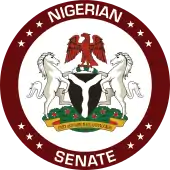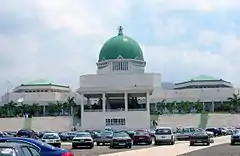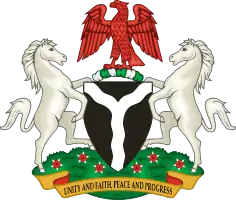Senate of Nigeria
The Senate is the upper chamber of Nigeria's bicameral legislature, the National Assembly of Nigeria. The National Assembly (popularly referred to as NASS) is the nation's highest legislature, whose power is to make laws, is summarized in chapter one, section four of the 1999 Nigerian Constitution. It consists of 109 senators: the 36 states are each divided in 3 senatorial districts each electing one senator; the Federal Capital Territory elects only one senator. [1] [2]
For other senates, see Senate.
Senate | |
|---|---|
| 9th National Assembly | |
 | |
| Type | |
| Type | of the National Assembly of Nigeria |
| Leadership | |
| Structure | |
| Seats | 109 |
 | |
Political groups |
|
Length of term | 4 years |
| Elections | |
| Multi-member plurality system | |
Last election | 23-24 February 2019 |
| Meeting place | |
 | |
| Abuja | |
| Website | |
| http://www.nass.gov.ng/ | |
 |
|---|
| This article is part of a series on the politics and government of Nigeria |
|
|
The President of the Senate is the presiding officer of the Senate, whose chief function is to guide and regulate the proceedings in the Senate. The Senate President is third in the Nigerian presidential line of succession. He is assisted by the Deputy President of the Senate. The current Senate President is Sen. Ahmed Ibrahim Lawan and the current Deputy Senate President is Ovie Omo-Agege both members of the APC. [3] The Senate President and his Deputy are also assisted by principal officers including the Majority Leader, Deputy Majority Leader, Minority Leader, Deputy Minority Leader, Chief Whip, Deputy Chief Whip, Minority Whip, and Deputy Minority Whip. In addition, there are 63 Standing Committees in the Senate chaired by Committee Chairmen. [4]
The lower chamber is the House of Representatives.
Nigerian State Delegations
Functions of the Senate
Legislation
Bills may be introduced in either chamber of the National Assembly.[6]
Checks and Balances
The constitution provides several unique functions for the Senate that form its ability to "check and balance" other elements of the Federal Government of Nigeria. [7] [8] These include the requirement that the Senate may advise and must consent to some of the President's government appointments; also the Senate must consent to all treaties with foreign governments and it tries all impeachments.
Majority and minority parties
The "Majority party" is the party that either has a majority of seats or can form a coalition or caucus with a majority of seats; if two or more parties are tied the Senate President's affiliation determines which party becomes the majority party. The second largest party is the Minority party.
Term
Senators are to serve a term of four years until a General election. Senators have unlimited tenure[9] and can remain in the chamber for as long as they are re-elected in general elections.
Defection of some members in 2018
A group of 15 senators of Nigeria’s ruling party defected to the main opposition group underscoring rising political tensions thereby making the All Progressives Congress lose her majority stake, although Senate President Bukola Saraki was not among initially, but he finally decamped to the main opposition People’s Democratic Party on Tuesday, 31 July 2018. [10] [11] In August 2018, Senator Godswill Akpabio resigned as the Senate Minority Leader while joining the long list of Legislative defectors by joining the ruling APC. [12]
References
- Federal Republic of Nigeria, National Assembly. "Administration". Retrieved 7 August 2018.
- Federal Republic of Nigeria, National Assembly. "History And Roles". Retrieved 7 August 2018.
- Federal Republic of Nigeria, National Assembly. "Principal Officers of The Senate". Retrieved 7 August 2018.
- Federal Republic of Nigeria, National Assembly. "Find a Committee". Retrieved 7 August 2018.
- "National Assembly | Federal Republic of Nigeria". www.nassnig.org. Retrieved 3 March 2020.
- Article 58 of the Constitution of the Federal Republic of Nigeria (1999)
- Federal Republic of Nigeria, National Assembly. "Senate Constitutional Role". Retrieved 7 August 2018.
- Federal Republic of Nigeria, National Assembly. "Senate Constitutional Role". Retrieved 7 August 2018.
- "Pardoned for Senate". 7 August 2015. Retrieved 16 March 2017.
- David Malingha Doya and Paul Wallace. "Nigeria Ruling APC Party Loses Senate Majority on Defections". Retrieved 24 July 2018.
- Chudi, Felix. "Senate hurriedly adjourns till September 25 as PDP becomes majority party". Retrieved 24 July 2018.
- Vanguard, News. "Akpabio drops Senate Minority leader post". Retrieved 7 August 2018.
External links
- Official website
- Map of Nigeria States' Senatorial Districts (Each Nigerian state has 3 senatorial districts.)